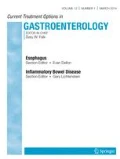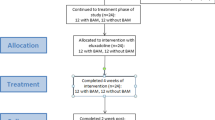Opinion statement
Irritable bowel syndrome (IBS) is a common gastrointestinal disease characterized by abdominal pain and change in bowel habits. IBS diarrhea predominant (IBS-D), which is arguably the most common subset of IBS, is also associated with rectal urgency, increased frequency, abdominal bloating, and loose to watery stools. Current treatments for diarrhea include mu-opioid agonists (i.e., loperamide, lomotil) and bile acid sequestrants (i.e., cholestyramine) while treatments for abdominal pain include antispasmodics (i.e., hyoscyamine, dicyclomine) and tricyclic antidepressants (i.e., amitriptyline). There are currently 3 FDA-approved treatments for IBS-D, which have been shown to improve both abdominal pain and diarrhea. Alosetron was initially approved by FDA 2000; however, its use is now limited to women with severe IBS-D symptoms refractory to other treatment. Eluxadoline, a mixed mu-opioid agonist, and rifaximin, a broad spectrum gut specific antibiotic, were both FDA approved in 2015. Eluxadoline has been shown to relieve abdominal pain and stool consistency in appropriate candidates. While large trials already showed the efficacy of rifaximin in treating non-constipated IBS for bloating, stool consistency, and abdominal pain, the recent TARGET 3 trial demonstrates that retreatment is also effective. While these new treatments significantly expand options for patients suffering from IBS-D, there is likely to remain a need for additional safe and effective therapies.
Similar content being viewed by others
References and Recommended Reading
Papers of particular interest, published recently, have been highlighted as: • Of importance
Guilera M, Balboa A, Mearin F. Bowel habit subtypes and temporal patterns in irritable bowel syndrome: systematic review. Am J Gastroenterol. 2005;100:1174–84.
Canavan C, West J, Card T. Review article: the economic impact of the irritable bowel syndrome. Aliment Pharmacol Ther. 2014;40:1023–34.
Singh P, Staller K, Barshop K, et al. Patients with irritable bowel syndrome-diarrhea have lower disease-specific quality of life than irritable bowel syndrome-constipation. World J Gastroenterol. 2015;21:8103–9.
Zhu L, Huang D, Shi L, et al. Intestinal symptoms and psychological factors jointly affect quality of life of patients with irritable bowel syndrome with diarrhea. Health Qual Life Outcome. 2015;13:49.
Crowell MD, Harris L, Jones MP, et al. New insights into the pathophysiology of irritable bowel syndrome: implications for future treatments. Curr Gastroenterol Rep. 2005;7:272–9.
Hasler WL. Traditional thoughts on the pathophysiology of irritable bowel syndrome. Gastroenterol Clin North Am. 2011;40:21–43.
Pimentel M, Chang C. Inflammation and microflora. Gastroenterol Clin North Am. 2011;40:69–85.
Talley NJ. Genes and environment in irritable bowel syndrome: one step forward. Gut. 2006;55:1694–6.
American College of Gastroenterology Task Force on Irritable Bowel Syndrome, Brandt LJ, Chey WD, et al. An evidence-based position statement on the management of irritable bowel syndrome. Am J Gastroenterol. 2009;104 Suppl 1:S1–35.
Cash BD, Rubenstein JH, Young PE, et al. The prevalence of celiac disease among patients with nonconstipated irritable bowel syndrome is similar to controls. Gastroenterology. 2011;141:1187–93.
Furman DL, Cash BD. The role of diagnostic testing in irritable bowel syndrome. Gastroenterol Clin North Am. 2011;40:105–19.
Porter CK, Gormley R, Tribble DR, et al. The Incidence and gastrointestinal infectious risk of functional gastrointestinal disorders in a healthy US adult population. Am J Gastroenterol. 2011;106:130–8.
Manabe N, Wong BS, Camilleri M, et al. Lower functional gastrointestinal disorders: evidence of abnormal colonic transit in a 287 patient cohort. Neurogastroenterol Motil. 2010;22:293–e82.
Chey WY, Jin HO, Lee MH, et al. Colonic motility abnormality in patients with irritable bowel syndrome exhibiting abdominal pain and diarrhea. Am J Gastroenterol. 2001;96:1499–506.
Lavö B, Stenstam M, Nielsen AL. Loperamide in treatment of irritable bowel syndrome—a double-blind placebo controlled study. Scand J Gastroenterol Suppl. 1987;130:77–80.
Hovdenak N. Loperamide treatment of the irritable bowel syndrome. Scand J Gastroenterol Suppl. 1987;130:81–4.
Wedlake L, A'Hern R, Russell D, et al. Systematic review: the prevalence of idiopathic bile acid malabsorption as diagnosed by SeHCAT scanning in patients with diarrhoea-predominant irritable bowel syndrome. Aliment Pharmacol Ther. 2009;30:707–17.
Chadwick VS, Gaginella TS, Carlson GL, et al. Effect of molecular-structure on bile acid-induced alterations in absorptive function, permeability, and morphology in the perfused rabbit colon. J Lab Clin Med. 1979;94:661–74.
Conley DR, Coyne MJ, Bonorris GG, et al. Bile acid stimulation of colonic adenylate cyclase and secretion in the rabbit. Am J Dig Dis. 1976;21:453–8.
Ao M, Sarathy J, Domingue J, et al. Chenodeoxycholic acid stimulates Cl- secretion via cAMP signaling and increases cystic fibrosis transmembrane conductance regulator phosphorylation in T84 cells. Am J Physiol Cell Physiol. 2013;305:C447–56.
Alrefai WA, Saksena S, Tyagi S, et al. Taurodeoxycholate modulates apical Cl-/OH- exchange activity in Caco2 cells. Dig Dis Sci. 2007;52:1270–8.
Barcelo A, Claustre J, Toumi F, et al. Effect of bile salts on colonic mucus secretion in isolated vascularly perfused rat colon. Dig Dis Sci. 2001;46:1223–31.
Odunsi-Shiyanbade ST, Camilleri M, McKinzie S, et al. Effects of chenodeoxycholate and a bile acid sequestrant, colesevelam, on intestinal transit and bowel function. Clin Gastroenterol Hepatol. 2010;8:159–65.
Wong BS, Camilleri M, Carlson P, et al. Increased bile acid biosynthesis is associated with irritable bowel syndrome with diarrhea. Clin Gastroenterol Hepatol. 2012;10:1009.
Orekoya O, McLaughlin J, Leitao E, et al. Quantifying bile acid malabsorption helps predict response and tailor sequestrant therapy. Clin Med. 2015;15:252–7.
Khanna R, MacDonald JK, Levesque BG. Peppermint oil for the treatment of irritable bowel syndrome: a systematic review and meta-analysis. J Clin Gastroenterol. 2014;48:505–12.
Cash BD. IBgard®, a novel small intestine targeted delivery system of peppermint oil, results in significant improvement in severe and unbearable IBS symptom intensity. Results from a US based, 4-week, randomized, placebo-controlled, multi-center IBSREST™ trial". DDW 2015; Abstract Su1373.
Gorard DA, Libb GW, Farthing M. Influence of antidepressants on whole Gut and orocecal transit times in health and irritable-bowel-syndrome. Aliment Pharmacol Ther. 1994;8:159–66.
Vahedi H, Merat S, Momtahen S, et al. Clinical trial: the effect of amitriptyline in patients with diarrhoea-predominant irritable bowel syndrome. Aliment Pharmacol Ther. 2008;27:678–84. Only trial of a tricyclic antidepressant (amitryptiline) in IBS-D.
Sohn W, Lee OY, Kwon JG, et al. Tianeptine vs amitriptyline for the treatment of irritable bowel syndrome with diarrhea: a multicenter, open-label, non-inferiority, randomized controlled study. Neurogastroenterol Motil Off J Eur Gastrointest Motil Soc. 2012;24:860–e398.
Houghton LA, Foster JM, Whorwell PJ. Alosetron, a 5-HT3 receptor antagonist, delays colonic transit in patients with irritable bowel syndrome and healthy volunteers. Aliment Pharmacol Ther. 2000;14:775–82.
Mayer EA, Berman S, Derbyshire SWG, et al. The effect of the 5-HT3 receptor antagonist, alosetron, on brain responses to visceral stimulation in irritable bowel syndrome patients. Aliment Pharmacol Ther. 2002;16:1357–66.
Bardhan, Bodemar, Geldof, et al. A double-blind, randomized, placebo-controlled dose-ranging study to evaluate the efficacy of alosetron in the treatment of irritable bowel syndrome. Aliment Pharmacol Ther 2000;14:23–34.
Camilleri M, Chey WY, Mayer EA, et al. A randomized controlled clinical trial of the serotonin type 3 receptor antagonist alosetron in women with diarrhea-predominant irritable bowel syndrome. Arch Intern Med. 2001;161:1733–40.
Camilleri M, Northcutt AR, Kong S, et al. Efficacy and safety of alosetron in women with irritable bowel syndrome: a randomised, placebo-controlled trial. Lancet. 2000;355:1035–40.
Camilleri M, Mayer EA, Drossman DA, et al. Improvement in pain and bowel function in female irritable bowel patients with alosetron, a 5-HT3 receptor antagonist. Aliment Pharmacol Ther. 1999;13:1149–59.
Lembo T, Wright RA, Team LI, et al. Alosetron controls bowel urgency and provides global symptom improvement in women with diarrhea-predominant irritable bowel syndrome. The American journal of … 2001.
Olden K, DeGarmo RG, Jhingran P, et al. Patient satisfaction with alosetron for the treatment of women with diarrhea-predominant irritable bowel syndrome. Am J Gastroenterol. 2002;97:3139–46.
Krause R, Ameen V, Gordon SH, et al. A randomized, double-blind, placebo-controlled study to assess efficacy and safety of 0.5 mg and 1 mg alosetron in women with severe diarrhea-predominant IBS. Am J Gastroenterol. 2007;102:1709–19.
Ford AC, Brandt LJ, Young C, et al. Efficacy of 5-HT3 antagonists and 5-HT4 agonists in irritable bowel syndrome: systematic review and meta-analysis. Am J Gastroenterol. 2009;104:1831–43.
Watson ME, Lacey L, Kong S, et al. Alosetron improves quality of life in women with diarrhea-predominant irritable bowel syndrome. Am J Gastroenterol. 2001;96:455–9.
Cremonini F, Nicandro JP, Atkinson V. Randomised clinical trial: alosetron improves quality of life and reduces restriction of daily activities in women with severe diarrhoea-predominant IBS - Cremonini - 2012 - Alimentary Pharmacology & Therapeutics - Wiley Online Library. Alimentary … 2012.
Chang L, Tong K, Ameen V. Ischemic colitis and complications of constipation associated with the use of alosetron under a risk management plan: clinical characteristics, outcomes, and incidences. Am J Gastroenterol. 2010;105:866–75. Assessment of side effects after reintroduction of alosetron under the RMP.
Ananthan S. Opioid ligands with mixed mu/delta opioid receptor interactions: an emerging approach to novel analgesics. AAPS J. 2006;8:E118–25.
Dietis N, Guerrini R, Calo G, et al. Simultaneous targeting of multiple opioid receptors: a strategy to improve side-effect profile. Br J Anaesth. 2009;103:38–49.
Lembo A, Pimentel M, Rao, et al. Efficacy and safety of repeat treatment with rifaximin for diarrhea-predominant irritable bowel syndrome (IBS-D): results of the TARGET 3 Study. Am J Gastroenterol. 109 (10) abstract 2014. TARGET 3 trial showing the efficacy of repeat treatment of rifaximin in IBS-D.
Pimentel M, Lembo A, Chey WD, et al. Rifaximin therapy for patients with irritable bowel syndrome without constipation. N Engl J Med. 2011;364:22–32. TARGET 1 and 2 trials of non-absorbed rifaximin in non-constipated IBS.
Lembo A, Dove S, Andrae D, et al. Eluxadoline for the treatment of diarrhea predominant irritable bowel syndrome: results of 2 randomized, double-blind, placebo-controlled phase 3 clinical trials of efficacy and safety. Digestive Disease Week; 3–6, 2014; Chicago, IL. Abstract 929d. Phase 3 trial of eluxadoline in IBS-D.
Compliance with Ethics Guidelines
Conflict of Interest
Judy Nee declares that she has no conflict of interest.
Mohammed Zakari declares that he has no conflict of interest.
Anthony J. Lembo declares previous consultantships with Actavis, Salix, and Prometheus.
Human and Animal Rights and Informed Consent
This article does not contain any studies with human or animal subjects performed by any of the authors.
Author information
Authors and Affiliations
Corresponding author
Additional information
This article is part of the Topical Collection on Motility
Rights and permissions
About this article
Cite this article
Nee, J., Zakari, M. & Lembo, A.J. Novel Therapies in IBS-D Treatment. Curr Treat Options Gastro 13, 432–440 (2015). https://doi.org/10.1007/s11938-015-0068-5
Published:
Issue Date:
DOI: https://doi.org/10.1007/s11938-015-0068-5



